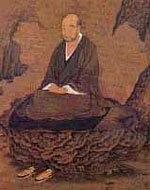Koso Wasan 21
Our teacher, Master T'an-luan,
Through the guidance of Bodhiruchi,
Burned his scriptures on immortality, discarding them forever,
And deeply took refuge in the Pure Land.
Master T'an-luan

T'an-luan was born in the north of China in 476 and died in 542. The Ch'i dynasty was in the ascendency at the time of his birth and, during his life-time the poet Hsiao Yen rose from common stock to become Emperor Wu of Liang. Emperor Wu was a devout follower and patron of the Buddha Dharma and is still remembered for his fine poetry.
Another notable person who lived during T'an-luan's time was the philosopher T'ao Hung-ching. T'ao Hung-ching is said to have been the person who gave T'an-luan a Taoist treatise on longevity. Although T'an-luan was a teacher in the Four Treatise School of the Madhyamika, he sought out T'ao Hung-ching during a time of illness, having become acutely concerned about his mortality. At this time T'ao Hung-ching was the director of a Taoist religious community near Nanking. This community was composed of married men and women and their families. The rule that T'ao Hung-ching developed for the community was to become the Mao Shan school of Tao. T'ao Hung-ching produced major works of Chinese literature, most notably the T'u ching yen i pen ts'ao, a classic of pharmacology.
I always wonder if it was this book that T'an-luan burnt in the process of his conversion to the Pure Land way. In any case, it seems to me to be doubtful that T'an-luan was ever a convinced and practicing Taoist. His career seems to have begun in the Four Treatise (shiron) School and to have moved to a greater emphasis on the teachings of the Larger and Contemplation Sutras which had come into circulation by the time of T'an-luan's birth.
In T'an-luan's time the Madhyamika School of Nagarjuna seems to have been thriving in China but it took two forms. One was the 'Three Treatise School', which based its teaching on two works by Nagarajuna and one by his pupil Aryadeva. To this T'an-luan's 'Four Treatise' School (shiron) added the Prajnaparamita Shastra, another work by Nagarjuna.
T'an-luan was ordained at the age fifteen and soon became a distinguished Madhyamika teacher. His work as a philosopher, however, was struck down when he succumbed to serious illness. His academic work and his remarkable ability as a teacher and philosopher completely failed him in the face of life-threatening illness. His self-confidence and esteem were no doubt shaken to their roots.
T'an-luan's experience is something he shares in common with all other human beings. Brilliance, skill, talent and intellectual power are often overthrown by the raw realities of life. In such circumstances a teaching that may have hitherto seemed utterly implausible and fatuous suddenly reveals itself as adamantine truth.
This is something that many of us experience and it is most encouraging to know that there is, for this, an ancient precedent - for which T'an-luan is one of the most remarkable and striking examples.